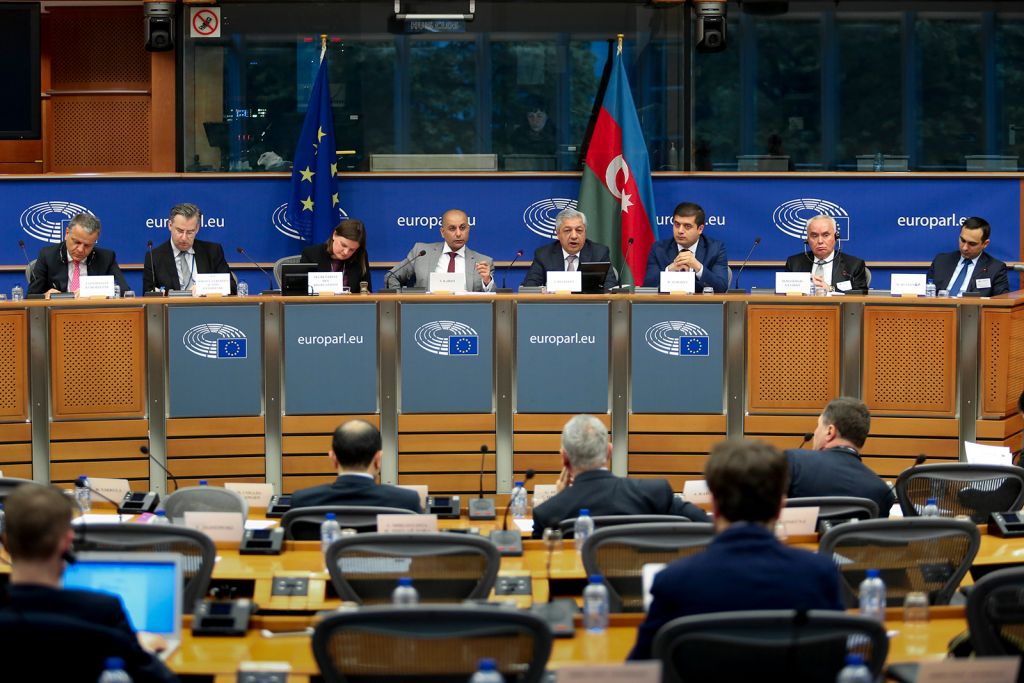“The European Parliament should pursue dialogue with any parliamentary delegation transparently and in line with its principles. With the Azerbaijani parliament, it instead silenced itself. The purpose of dialogue is to look into issues in good faith and find a path to address those issues, which is far from what the European Parliament did this time around,” commented Florian Irminger, Head of Advocacy at HRHF.
On 2–3 May 2017, the EP hosted the 14th meeting of the European Union (EU)-Azerbaijan Parliamentary Cooperation Committee (PCC) to discuss bilateral cooperation. Dialogue between the parliaments was previously interrupted when the EP adopted resolutions on Azerbaijan in September 2014 and September 2015.
These resolutions called on the Azerbaijani authorities to cease harassment and intimidation of civil society organisations, opposition politicians and independent journalists. The resolutions also listed names of numerous civil society activists unjustly imprisoned. This contributed to increase the international pressure on the authorities, which ultimately led to the release of several political prisoners. The key concerns of the 2015 resolution are still valid, yet they are now absent from the EP dialogue with the Azerbaijani parliament.
Starting up the dialogue in September 2016, the co-chairmen of the EU-Azerbaijan PCC, Sajjad Karim and Samad Seyidov, issued a statement affirming that “the PCC and all other interactions provided an opportunity for areas of mutual shared understandings to be explored and areas where disagreement had occurred to be examined and views of both sides shared.” The statement also reads that “Co-Chairs are equally committed to ensure that circumstances do not arise again whereby dialogue between the European Parliament and Milli Majlis is interrupted on any future occasion.”
As testified by the statement above and by the absence of public reaction to human rights abuses in Azerbaijan in the last months, the EP, for its part, has accepted being less vocal in order to resume inter-parliamentary cooperation. However, at the recent PCC meeting, there were no signs that the Azerbaijani parliament is willing to compromise and engage in real dialogue.
MEP Heidi Hautala (Greens/EFA/Finland) tabled amendments to the final joint statement of the PCC to highlight that “the upholding of the rule of law, democracy and good governance, as well as the defence of human rights and fundamental freedoms must be key values at the core of the new agreement under negotiation,” and that the announcement of Azerbaijan to leave the Extractive Industries Transparency Initiative (EITI) weakened the EU-Azerbaijan strategic energy partnership.
These amendments were voted down in block by the Azerbaijani delegation supported by EP rapporteur on Azerbaijan, MEP Norica Nicolai (ALDE/Romania), who also praised the judicial reform in Azerbaijan and current legislation that – in her view – makes judges fully independent.
“It is disappointing that one of the few attempts to transform this exercise of whitewashing of Azerbaijan’s human rights abuses into a real discussion was voted down,” commented Florian Irminger.
Human rights and rule of law concerns raised mainly by the European External Action Service (EEAS) representative were also rapidly dismissed as partial or incorrect information by the members of the Azerbaijani parliamentary delegation. As an example, Azerbaijani MP Azer Karimli accused the EU and the Council of Europe of using lists of so-called political prisoners that are actually mainly composed of “radical Islamists.” MEP Iveta Grigule (ALDE/Latvia) suggested that information provided by NGOs on cases of human rights violations is far from always being correct, and this fuelled rants by Azerbaijani MPs against those providing such information to the EP.
“The EP cannot allow itself to be further silenced in the name of a futile dialogue. Such practice risks to compromise the important work done by the EP during the years of denouncing human rights violations in Azerbaijan, and to damage the institution’s image as a beacon of freedom for oppressed human rights defenders, political activists and journalists in the country,” concluded Florian Irminger.
European Union (EU)-Azerbaijan Parliamentary Cooperation Committee (PCC)
On 2–3 May 2017, the European Parliament (EP) hosted the 14th meeting of the European Union (EU)-Azerbaijan Parliamentary Cooperation Committee (PCC) to discuss bilateral cooperation. The PCC is the framework through which delegations of the EP and the Milli Majlis (Azerbaijan parliament) meet once a year to discuss their bilateral cooperation.
Human Rights situation in Azerbaijan
Despite the release of key civil society activists in 2016, new people have been arrested and the authorities have failed to change legislation that attempts to legally justify the detention of human rights defenders, journalists and activists, who can face imprisonment at any given time, on purely arbitrary accusations.
With its repeated waves of repression against civil society and media, Azerbaijan has managed to weaken what used to be in 2010 an active and professional although small community of people working independently to promote human rights in the country.
Read Azerbaijani and international partner organisations and HRHF’s March 2017 briefing note on Azerbaijan, prepared for the Human Rights Council. It addresses Azerbaijan’s targeted and systematic repression of human rights defenders and civil society, and crackdown on independent media and dissenting voices.





